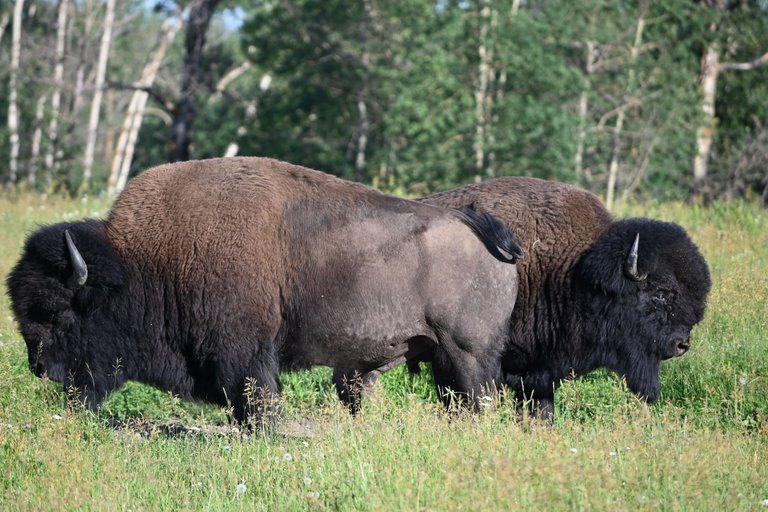Food for thought: Foot prints (part one)
What's up Peeps!
Today, I was thinking about a bunch of random things, like any other day. The thought topic of the day was foot prints in various forms. They probably don't all go together but from the time we are born until the time we die, we leave foot prints. Footprints everywhere. footprint in peoples hearts, foot prints on people's minds, carbon foot prints, online foot print, foot prints in the sand to be eventually blown away in the wind, foot prints on the nature trail, everything we do spreads some form of breadcrumb of evidence. You get the point, in everything we do or interact with, we subtly forever change in some way, negative or positive. How often do we take time to analyze our behaviors and how it interacts with our environment. Is it a benefit? Is it to a detriment? We all make our individual choices.
Reading all the nature worship based religions across the ancient Americas and Celtic or Druid based in Europe, one theme they had in common, walk with leaving minimal footprints. In the Rockies for a high tourism area, leave with taking nothing but photos from the land and leaving nothing but foot prints in the trail behind...Conscious walking. Why it's so hard to identify ancient sites, they were flawless at it compared to us. From the past to today, how do we compare? Well...we all know as a species, we might have some improvements to do in various ways.

Probably not going to be my most popular topic but today I will explore and compare my own and where I have made improvements, becoming more aware of what I leave behind along with ways to consume smarter to enjoy a similar yet more sustainable way to consume without feeling deprived about it. Consuming smarter. There is no denying that in today's world, we have an over consumption problem fueling an even bigger over production problem to an unprecedented scale that I don't think anyone of us is fully mentally equipped to comprehend. If you live in a large city, especially one with snow after winter, no doubt it looks pretty trashy pun intended but it's not funny , it's gross.
During the covid lockdowns, it was disposable masks anywhere but the rubbish bin, all over the ponds, blowing in the trees like winter has somehow produced clothy blue fake wintery leaves wanna be like some man made merge with nature DYI project gone horribly wrong. Christmas trees decorated in covid blue. Yuk. Ok, yes this post will be full of snark and judgement but it's for growth so whatever... fuck it. Obviously I have my own foot print blunders over the course of my life that I have altered my habits because yes, we are building ourselves a nice giant garbage grave of a planet, no wonder we feel all out of place, nothing is truly natural anymore. Even the purest thing in the world, water is filled with rubbish and micro plastics across the world.
If you live in a rich enough country like the US or Canada, most citizens, we are shielded from much of the mess we really make and dump it on someone else oversees, if we don't see so there isn't a problem right? Much of so called recyclables get sent to third world countries who probably paid good money to process our garbage for recycling revenue, except ...more and more, it becomes just that....a big pile of garbage that they paid hard earned money for and have no place to dump. Our first world structure is highly harmful in other places of the world where the laws are a little loose or where the citizens have no choice but to keep accepting it because what little salvage revenue they get is better than nothing. So we the consumer blindly keep feeding the beast to our detriment as a collective...To our wallets and our home planet.

What do we do? Go off the grid? stop consuming? start living back in ancient ways? All of which sound pretty inconvenient. We had a taste of consumption and we like it and can't deny it. Each is affected differently based on individual impulse control, personal preferences, habits that become second nature, whatever fuels our consumption wants and needs. There are many areas to frown upon yet they are also a basic need for another, how do you balance it all with 8 billion people? With many things plastic, a non bio degradable material that last forever and ever...Do we do away with plastic? How about our clothing choices?
FAST FASHION
Obviously, various blogs, Instagram accounts, youtube Shein or Temu unboxing videos, Old Navy, forever 21 and other like brands, we are all aware of them and the digital culture around it as we all collectively choose to share our loot in excitement. We are human, we are allowed and in today's standards of communication is online. Where is the line drawn between promoting over indulgence and wasteful culture and a healthy display of what the rewards of our hard work got us.
As society gets more expensive, these cheaply produced goods are also cheaply gotten by the consumer. Is it cheaper in the end? Is it responsible? Is it further fueling an addiction to disposable society, an environmental disaster, a second hand market apocalypse? Should we do away with fast fashion trends? What a complicated dilemma to analyze. What is the moral thing to do. Do we rely on companies and blame them when it all goes wrong like we have been doing for years with everything else? Do we point the finger at the person in the mirror, the consumer? Lets explore the controversy behind the ethics of it all.
Out of curiosity, I watched a series of such videos from different vloggers to see how each of them shared and why or what seemed their intent. It yielded interesting results. I already had my own opinion in mind and ended up keeping the same in the end but it was still a nice food for thought and just think. Overall, I still think for the most part from the unboxing videos were a gross representation of over consumption as many seemed to get hundreds of dollars worth of goods and often monthly or more often.

That aspect I really judged and hard. It's ok to want nice trendy things but I mean, to just buy things to be sent to a clothing re-selling facility often run by charities a few months later like Goodwill thrift shops here in Alberta. Seems like a waste of money to just wear something once or twice during the style's trending phase. for the most part, that's about how many wears one gets, once you wash it, it begins to fall apart and fast as the fibers are made of thinner materials besides the already mostly synthetic non-biodegradable nature of the fabric.
On the other side of the coin, the quiet consumers, the humble ones, the ones just trying to have clothes to wear in an increasingly expensive world where a paycheck is getting stretched thinner and thinner by the day. There is a saying that it's expensive to be poor and that's just the plain truth. Instead of being able to afford a little more on a quality product, some are perpetually cycled into a cheap alternative that will hopefully hold until it doesn't and a few bucks can be found to get another hope it holds item. Contributing to having to spend more overtime. Meanwhile not having the cash to just get better in the first place. Been there done that...not fun.
Crafting regulations on fast fashion for over consumption and garbage disposal issues would also impact the people who are just trying to have a nice enough wardrobe on a limited budget to look however they want or presentable for a professional setting to aim higher at life and socialize in style with their peers. Wear them responsibly until no longer wearable and then it's life and usage extended as it turns into an I don't care if I stain it or destroy it item for house or yard work. (Yeah, lets come clean, we all have those items secretly 😆) How do you regulate the gluttony consumption without impacting the ones that truly need such a concept like fast fashion?
HARD KNOCK LIFE EXPERIENCE
Growing up, much of my clothes were church hand-me-downs, it was a little embarrassing especially when it used to belong to a rich kid in school and they knew it, their friends knew it. Parts of it was socially awkward indeed but it was clothes and as a little kid well, I couldn't do much to help myself in that department. As I got on my own, got a job and whatever else one is expected to do, with nothing to work with but the clothes on my back, getting a job depends on looking professionally presentable with no money. What a dilemma.
Fast fashion wasn't really a thing yet, most was still made into cotton and other synthetic material were just making an emergence, at least in the small town where I lived. Having cheap fast fashion would have been a godsend so I despite it's current destructive path, there is also a critical need for such a product too. Being in a small town, thrift shops also weren't really a thing, when people are done with their clothing, they just donate them to the needy or churches at the time, not for re-sale. To build an adequate wardrobe when you already have to pick between food and power, I'm sure some can still relate to the struggle today. The potato famine didn't die in Ireland and probably still alive and well across the world.
I took heed and fed from mostly potatoes for a few years when I was poor. I still got sick of them but I can probably make potatoes 100 ways. Useless knowledge to have and unrelated to clothing but you are getting it anyway, I know. I know... Working at a restaurant as a cook or a server, I had access to their order catalogue, so I would preplan and buy super bulk at their prices. I don't know if they still do that but doesn't hurt to ask, if they do allow it, well then I had a big box of bulk chicken breasts to learn how to cook 100 ways too because, well chicken and potatoes gets old after a month. A big costco size bag of frozen veggies to add as a side. Cheap nutrition in a pinch at least. It worked as long as I needed it to while I both worked and got a better education at the same time often times.
Moving to Alberta, well now it opened a few more doors especially having chose Edmonton as my new home base to establish my own roots towards a wider range of opportunities for a better future. Scary times for a small town me at the time! Culture shock really. Can't say I have ever fully adapted to everything Alberta but many new concepts opened up for me to explore and make my life better or at least appear like it...You know fake it till you make it sorta thing. Not in a deceitful way but we all know how first impressions and image is important to get a job. Now I had nothing but a suitcase and a cage with 2 cats, a what I hoped was a safe place to stay (Don't worry, it was).
Also meaning, I was building from scratch, completely. Do an experiment if you're ever bored and looking for something stupid to do, and pack your suitcase and call it your new life for a few minutes and process that as if it's real, perhaps putting yourself in someone else's shoes experiment. I don't think most of us are prepared to what that looks like until faced with the choices. Do I want to bring my favorite things that I cherish but no real life usage or what bare essentials to maximize necessities to reduce cost of re-establishing. Doing so also is a stark realization how most of our lives are full of too much stuff. I'm equally guilty don't worry. My current life no longer fits in a suitcase.
My budget to re-establish and get proper work attire for work with replenishing other necessities I had to leave behind and the food I would need, my 2006 budget was $120 until I got a job and got paid. I had already counted my legs as my form of transportation. All I could afford. Ouchy. even back then, it still didn't buy much. Reality is, because I'm no longer experiencing it, times haven't changed really, just fresh faces experiencing it. Whatever the reason may be, war, poverty, escaping abuse cycles...etc. Life can change for anyone in the blink of an eye. Sometimes it's just the circumstances of childhood and otherwise. Life is complicated after all.
That's when I discovered Goodwill thrift shops, at $2-5$ per shirt and maybe $5 for a pair of pants, I managed to get a new wardrobe acceptable and professional enough for under $40 and I probably still have some of them too almost 20 years later, especially the tops. Here in Edmonton, There is a lot of poverty, increasingly so I might add but there is also a lot of rich people with money to burn, a short attention span and a fast turnover of consumer good in good condition even used to make it for an affordable price often being name brand item. What a treat for my small town church-hand-me-down ass. Style on the cheap. 1 million people offered more anonymity to wearing second hand clothing compared to a parish of 500! 😅
I did that for quite a few years, even as I entered the construction scene, my work boots were always new but everything else wasn't. Whatever I could afford or find when I needed it. Even when money wasn't tight, I continued. In my mind, it was something being saved from a landfill when there wasn't anything wrong with it besides being out of favor of it's consumer. Cheap quality goods, consumption with a lesser carbon foot print also merging the fact the no additional production emissions or transportation required. Responsible style on a budget! Both wallet approved and consumer friendly. What a concept!
As the years went on and fast fashion took a good foothold, now these second hand goods that the budget conscious consumer relied on to either rebuild life or sustain an already challenging one, or just for the thrill of the chase because much like me, many have made it a sport to spot those few unique items and little luxuries of life that we all wish we had but probably shouldn't buy brand new at a cool bargain. Back then, many things still had price tags on the clothing so second-hand brand new. Every thrifter salivates at these items, we all know it comes from a rich closet.
Whatever the reason, now it's flooded with already almost destroyed second hand clothing that often doesn't sell. After being rejected by all the thrifters, it gets packed up into Sea-Cans and shipped in Africa's poorest of regions where they rely on second-hand textile industry to make a living. They buy bulk in big bags and they cannot inspect it's contents until it is purchased and taken to their sorting location. From there they unpack and sort what is usable and what is just pure garbage donated carelessly. Sometimes good intentions can still be harmful in some way.
With the amount that is usable diminishing as it gets replaced by fast fashion non-durable and non-biodegradable synthetic fabrics that are often times not sellable even there, it ends up piled in landfills that can no longer keep up. Taking valuable real estate from some of the poorest living on the edges of these urban centers, also dependent on a basic level of quality in textiles they can harvest and recycle for their own income. It's not really fair for us to dump our garbage on them anyway, we are the main consumer, we should probably become aware of where our consumer goods come from and where they end up when they fall out of flavor. It's important to keep an informed everchanging opinion so we can make an equally informed decisions on which company and their ethics we chose to support.
Many like to point the fingers at big corp for our own personal short comings and lack of restraint, maybe just not caring of the repercussions. They are still guilty, yes, but the consumer is still 50% of that transaction nonetheless. If you don't buy from companies with poor ethics in some way, they have to change to stay relevant with an evolving more conscious society. it's been proven time and time again especially in the last few decades with the internet. consume longer, throw away less, the habit becomes easier on the wallet.
I no longer buy much from thrift shops as far as clothing because the landscaped has changed much with the emergence of internet markets like e-bay and other online re-selling. I don't buy much new anymore either, I have a versatile classic wardrobe that can be accessorized to look differently. What was once a hobby sport has become a professional sport.
With a steady increasing cost of living and stagnant wages, making ends meet is the new rich...at least seems like...people look for creative ways to add additional income and reselling bargain-hunts for a profit, often to the detriment of shops trying to do a good deed. Knowing they are getting raided by re-sellers, then they have to mark up their stock because the sale of the goods into cash can still help those in greater need.
That also comes to the detriment of those in need, because now their affordable source of clothing is now 3x the price but who deserves it better? The person in need or the person trying to make ends meet, who well is probably almost in need themselves? Another strange moral dilemma society should observe. In the state of over production and wastefulness culture we live in. Surprising we even have such a problem in the first place. Therefore justifying the need for the environmentally harmful fast fashion that we should be more mindful with consumption. Everything is a delicate balance. The big garbage pile says there is no shortage of resources, just really bad management of it.
In most of our minds, how do we justify the needy? Where access to affordable quality clothing is a necessity? Born poor? Long term cycles of family poverty? Lack of personal effort? There are many stereotypes out there, as many as there is people. We all see and experience things differently to a reasonable sense. I can't speak for everywhere across Canada or the world for that matter but here in Edmonton, we welcome in a constant flow of refugees from other countries often fleeing chaotic scenes in a pinch with limited financial resources to re-establish.
Others may come from impoverished parts of a wealthy country in search for something better. Consider yourself lucky if you are one born to a normal life and never have to experience what starting life over from absolute scratch really feels like, others ...well we have to get creative until we find our step. The kind nature of humans and used goods is essential. As displacements in the world increases, the help resources dry up faster. Having an affordable closet is a critical step in presenting an image either for school or to get a job. We live in a society that judges others too much yet not ourselves. Perhaps the root of the lack of compassion in society leading to probably what we see today. An exploitative civilization that lacks cooperation. Are we evolving or devolving?
Alright I don't have those answers and I don't expect you to but it's something to think about. Resource management is important, collectively, I think we have a huge FAIL we are going to have to face and do better. In the meantime, if 1 million people committed to putting one item back on the shelf every week or every month, putting back something we don't really need. Over time it becomes a habit, saving lots of dough not spent on things that will end up in a landfill out of boredom. If I will get bored then it has to hold some form of resale or collecting value. Imagine the impact collectively every month, one million items not consumed...one million plastic trinkets not ending up in landfills every month...consistently month after month. What about after 10 years of more self aware consumerism? What if one billion people put one none sense item back collectively?
Each individual footstep seems hardly noticeable but as a whole, it adds up both in the positive attributes of society or the negative. It's ok to like and have nice stuff, spoil ourselves a little, just be better consumers for our own sake, grow better self-awareness. Save them precious $$ in the process. Save over burdened garbage dumps from becoming worse while we might still can. That or we will be forced to at some point as governments take excessive measures a minute too late with bans and taxation. Self policing, self-control. Doing the right thing...for ourselves and others. Having something to hold proud to hand in to future generations. Small cumulative steps + consistency = large changes in time.
After looking of these beautiful pictures, think it thru...this is what we stand to lose if we don't start making an effort soon, become more self aware of our consumption habits. Next time you are at your favorite nature haven from the urban madness, tell nature why it isn't worthy of your thought or effort? Think of all it provides? Our own very life. Lose nature, lose life. Our very building blocks, getting burried in garbage all over the world.
Feel free to share in the comments if you have your own more consumer/planet friendly clothing habits that you have become more self aware and changed your ways that you would like to share so we can each gain from the different perspectives available. Do you ever think of where your clothing comes from or ends up? Do you have experiences to share where the second hand market has helped you even temporarily? What are your thoughts on fast fashion culture? Our planet, our home needs that conversation to be had so we can keep our lands as pristine as possible for as long as possible without sacrificing the comforts we have all gotten accustomed to. Balancing nature and human. This is just part one. I have a few more avenues to explore. A fun topic for the week I suppose.
Laterz! xox





View or trade
LOHtokens.@ladiesofhive, you successfully shared 0.1000 LOH with @ladyrainbow and you earned 0.1000 LOH as tips. (2/30 calls)
Use !LADY command to share LOH! More details available in this post.
Growing up in an exceptionally mediocre family, Mom made all our clothing, curtains, bedding by sewing after a full day at work doing accounting. Dad grew vegetables, raised chickens with variety of fruit trees on a small 800 meter squared including house consisting 3 bedrooms, 1 bathroom, lounge, kitchen, dining room, housing 4 children and parents. Made ends meet yet never doing without!
Lesson in life knowing it is never easy, with many much poorer residing in a third world country. One Sunday school dress, school uniform, garden shorts and shirts, pajamas all made by Mom. Cotton was the answer then to this day, no clothing ever purchased on a whim, except first year of working building a cupboard up that lasted, mostly sewed on the old Singer tread-wheel machine.
Where has all natural fabric gone, hessian bags for vegetables, cotton or wool clothing, glass bottles? Only the rich could afford tweed or satin, yet now the world has gone crazy with polyester, nylon all fabrics where the skin does not breath nor does it last.
Smiling in agreement the world needs to rethink, repurpose we cannot sustain a healthy planet if we don't start in the home.
@tipu curate
Upvoted 👌 (Mana: 32/72) Liquid rewards.
Thank you for sharing your experience! that's an amazing story. I can relate the home made clothing at least some of it. Sounds like you had an organic experience that thought you important life skills. Something many lack as the generations get disconnected from people and more to the internet. I remember the glass bottles. Actually come to think of it, much of our packaging could be turned into other household dishes. Here in Canada, we had mustard glasses I like to call them. They were mustard jars but well decorated and as we emptied them regularly over the years, they would make nice set of drinking glasses. It was designed that way. Once they turned glass into milk cartons, we started to cut them in half and use the bottoms as plant starters for tomatoes and such since in Canada with winter, we had to grow our seedlings in the house for a few month before the ground thawed so we had time to get a full crop/harvest cycle. We could get bumper crops that way on some stuff too.
I know everyone thinks plastic is more convenient but, I like the glass re-using aspects the world once had at least in part. Canning is a lost art too. Even today, I like to buy the premade spaghetti sauce in jars for a quick meal, they are actually packaged in Mason Jars if you take the time to wash and peal the label. Some companies are still pretty good so it is do-able on a mass scale. Just a question of consumer conscious decisions and putting the effort.
Even in Eastern Canada, childhood in the 80's had similarities to yours...gardening, foraging, the limited plastics we had even if it was a ziploc baggie or a piece of tin foil, better believe it was getting washed and reused until it just couldn't hold stuff anymore. I was young but I'm pretty sure I grew up in a significant period of economic depression/recession. Skills that need to come back. No money is certainly a challenge for many families but it builds character and strength that all the riches in the world can't buy. Obviously I don't wish it on anyone for the sake of " mental strength" nonetheless. Some weeks there were $25 dollars a week to feed 5 people left over after all the other household things. My grand-parents were better established in life but being from the great depression of the 1920's and WW2 era right after, well they were full of money saving/wealth building tricks just the same. Even those who had money thought me how to live frugally or maximize the value gotten for a dollar.
I think the way the first world economies are going and faster dollar devaluation, it will be important to know hot to return to the "basics" sooner rather than later and find a way to accommodate like your family did if we like it or not.
We were the fortunate ones, discipline was dealt out, duties given for daily tasks to each in the home, no excuses acceptable. Still loved and guided everyday during formative years that has stood testament to time.